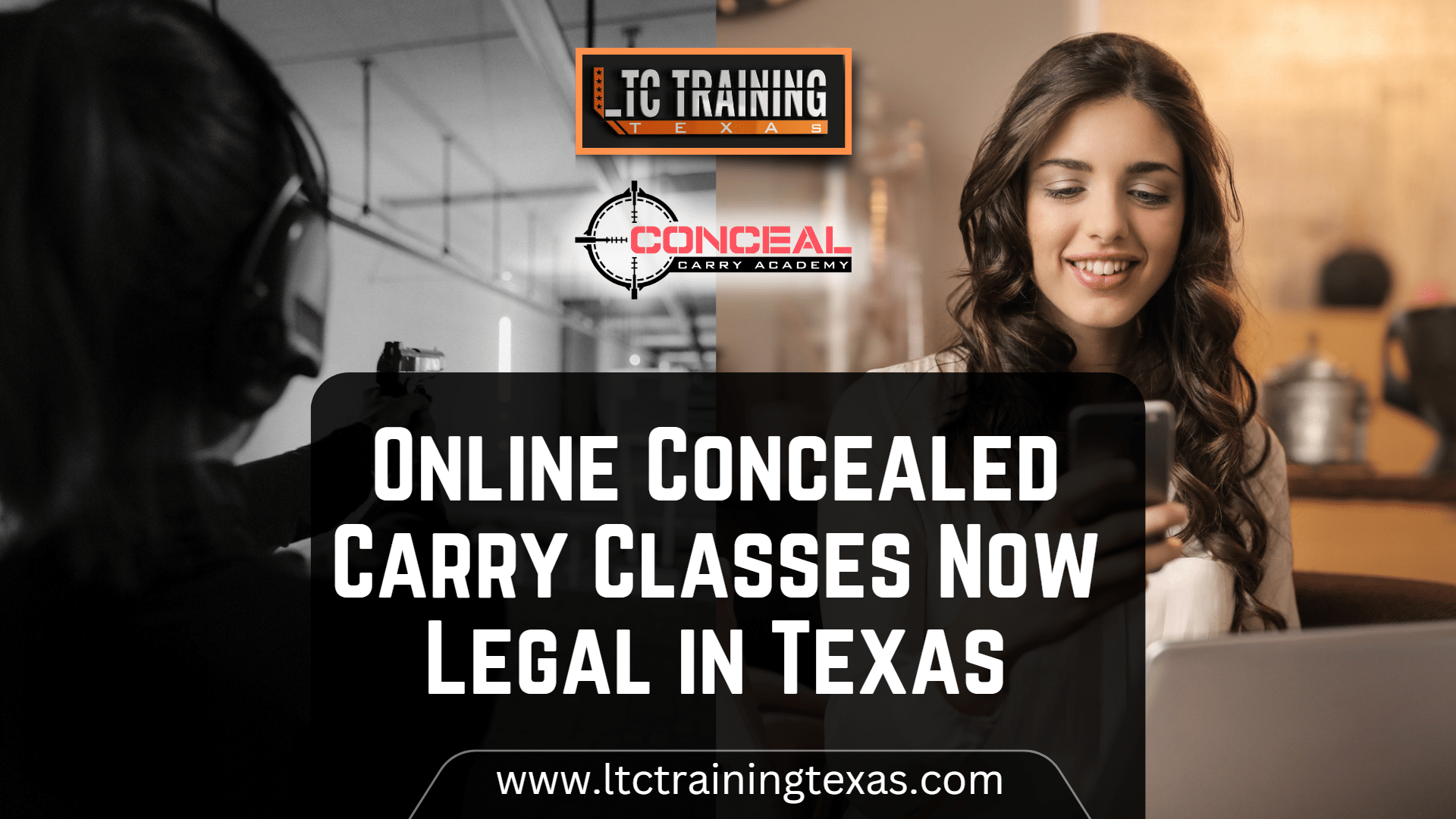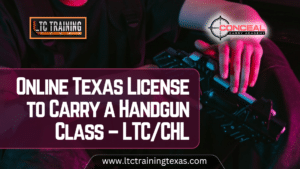Texas Concealed Carry Class Online: Your Comprehensive Guide to Getting Your LTC from Home
Thinking about getting your Texas License to Carry (LTC) but short on time or tied to a busy schedule? The world of The Texas Concealed Carry Class Online might be the perfect solution for you! This comprehensive guide dives deep into everything you need to know about acquiring your LTC online, from legality and benefits to choosing the best course and fulfilling all requirements.
Whether you’re a working professional, a parent juggling childcare duties, or someone who simply prefers the flexibility of learning at your own pace, an online Texas concealed carry class can be a convenient and effective way to get your LTC. In this blog post, we’ll address every question you might have about this increasingly popular option.
Is an Texas Concealed Carry Class Online Legal?
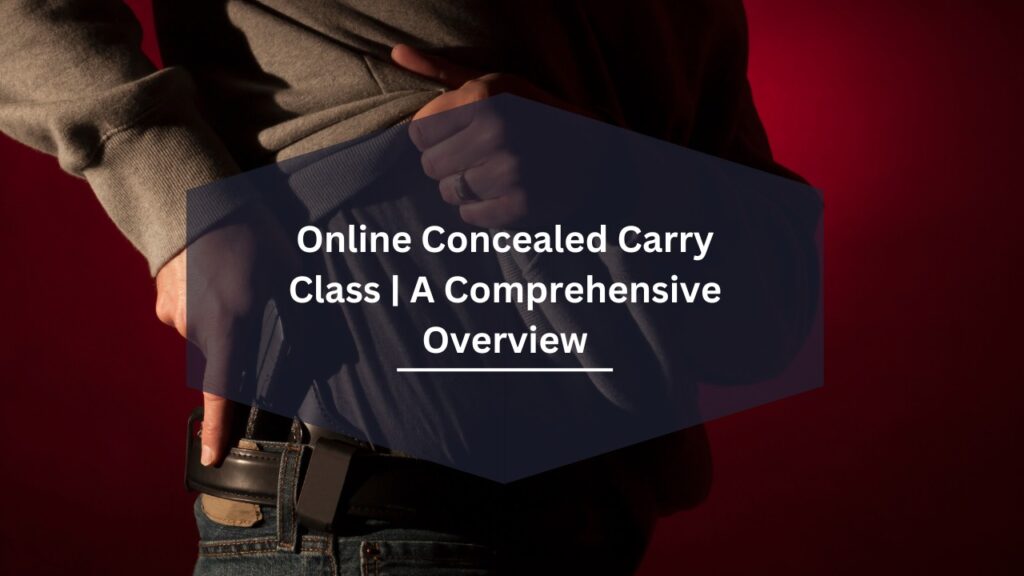
Yes, you can absolutely take an online Texas concealed carry class to get your License to Carry (LTC). The key thing to remember is that the course provider must be approved by the Texas Department of Public Safety (DPS).
The Texas DPS outlines the specific requirements for LTC instructors and course content. Any online course you choose must adhere to these guidelines to ensure it qualifies for LTC application purposes. We’ll cover exactly what those requirements are in a later section of this guide.
Here’s a benefit of online courses you might not be aware of: In some cases, they may even be accepted for LTC renewal in Texas. Check with your chosen course provider to see if their curriculum meets the renewal requirements set by the DPS.
Why Choose an Texas Concealed Carry Class Online?
If you’re on the fence about whether an online Texas concealed carry class is right for you, here are some compelling reasons to consider this convenient and flexible option:
- Unmatched Convenience and Flexibility: This is perhaps the biggest perk of online LTC classes. You can take the course whenever it fits your schedule, at your own pace. No more scrambling to attend evening or weekend classes that might conflict with your work or personal commitments. The entire course curriculum is available online, allowing you to learn in bite-sized chunks during your downtime or dedicate longer stretches of focused study time whenever you have it.
- Time Savings: Skip the commute and classroom time commitment. Online courses allow you to learn the required LTC material from the comfort of your home, at your preferred learning pace. This can save you a significant amount of time, especially if you have a busy schedule.
- Cost-Effectiveness: Online LTC classes can be more affordable than traditional in-person classes. There are no additional costs associated with classroom rental or instructor travel time, which can be reflected in the course fees. While the price can vary between providers, you’ll generally find online courses to be a budget-friendly option.
- Self-Paced Learning: Some people learn best in a structured classroom environment, but others thrive with self-paced learning. Online courses cater to this preference. You can revisit modules, rewind lectures, or take breaks as needed to fully grasp the concepts before moving on. This can be especially helpful for those who require extra time to absorb new information.
- Review and Retention: Unlike traditional classroom settings where information moves quickly, online courses allow you to revisit course materials and quizzes as many times as needed. This can be a valuable asset for maximizing knowledge retention and ensuring you feel confident about the LTC application process.
Am I Eligible for a Texas Concealed Carry Class Online?
In general, if you meet the standard eligibility requirements for a Texas License to Carry, you can enroll in an online LTC class. Here’s a quick rundown of the eligibility criteria set forth by the Texas DPS:
- You must be a U.S. citizen or a lawful permanent resident.
- You must be at least
21 years old.18 Years Old Now!! - You must not have been convicted of a felony or Class A misdemeanor offense.
- You must not be under indictment for a felony or Class A misdemeanor offense.
- You must not be a fugitive from justice.
- You must not have been dishonorably discharged from the military.
- You must not be a person who has been committed to a mental institution (unless you have been restored to mental competency by a court of law).
Important Note: Even if you meet the general eligibility requirements, there might be exceptions or specific situations that could disqualify you from obtaining an LTC. For the most up-to-date and accurate information, it’s always best to refer to the official Texas Department of Public Safety website (https://www.dps.texas.gov/section/handgun-licensing).
However, there’s one aspect to consider that can influence your decision on whether an online course is right for you: prior experience with firearms. If you’re a complete beginner with no experience handling a gun, an in-person class with hands-on instruction from a qualified instructor might be a better starting point. While online courses cover essential firearm safety principles, the in-person setting allows for personalized guidance and immediate feedback on safe gun handling techniques.
That being said, many online LTC providers offer comprehensive video modules that visually demonstrate proper gun handling procedures. Ultimately, the choice between online and in-person instruction depends on your individual learning style and comfort level with firearms.
What Do I Learn in a Texas Concealed Carry Class Online?
Rest assured, online Texas concealed carry classes equip you with the same fundamental knowledge as traditional classroom courses. The curriculum must adhere to the specific requirements mandated by the Texas Department of Public Safety (DPS) to ensure it qualifies for LTC applications. Here’s a breakdown of the key topics you’ll cover in a typical online LTC class:
- Firearm Safety and Safe Handling Procedures: This is a critical foundation and the core principle of responsible gun ownership. The course will delve into safe gun handling practices, proper storage techniques to prevent accidents, and how to avoid common safety mistakes. You’ll learn about different gun parts and their functions, safe loading and unloading procedures, and how to maintain situational awareness while handling a firearm.
- Texas Laws on Concealed Carry and Use of Force: This section focuses on the legal aspects of carrying a concealed handgun in Texas. You’ll learn about where you can and cannot carry your LTC, when you are authorized to use force in self-defense, and the legal implications of using deadly force. Understanding these laws is crucial for responsible gun ownership and to avoid legal trouble.
- Handgun Use Fundamentals (if the course includes video instruction): Some online courses may incorporate video modules that visually demonstrate basic handgun use fundamentals. These modules might cover proper grip technique, aiming principles, stance, and safe trigger control. It’s important to note that these video demonstrations cannot replace the hands-on experience of practicing at a shooting range under the supervision of a qualified instructor.
- Dispute Resolution and De-escalation Techniques: A crucial aspect of responsible gun ownership is understanding how to avoid situations where using a firearm might become necessary. The course will explore conflict resolution strategies, de-escalation tactics, and how to maintain situational awareness to minimize the risk of needing to use deadly force.
- License Carry Do’s and Don’ts: This section provides valuable information on the proper etiquette and legal guidelines for carrying a concealed handgun in Texas. You’ll learn about how to interact with law enforcement during encounters, how to properly present your LTC during traffic stops, and other important tips for exercising your right to carry responsibly.
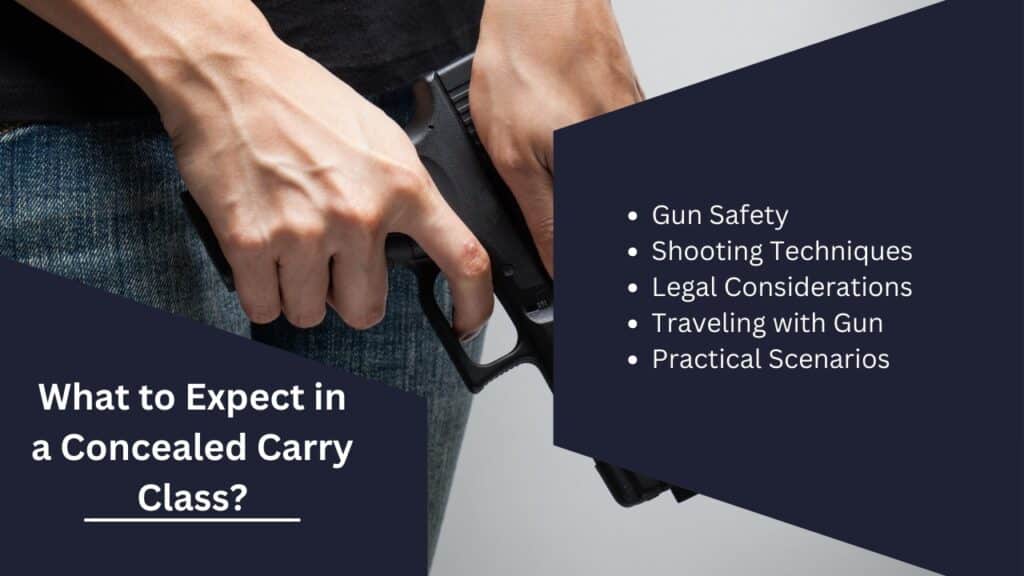
By thoroughly covering these essential topics, online Texas LTC classes equip you with the knowledge and understanding necessary to not only obtain your LTC but also to carry a concealed handgun safely and legally within the boundaries of Texas law.
How Does the Texas Concealed Carry Class Online Work?
The specific format of online LTC classes can vary slightly between providers, but here’s a general overview of the process:
- Enrollment and Payment: You’ll find a variety of online LTC class providers by searching the web. Once you’ve chosen a reputable provider that aligns with your needs and budget, you’ll typically enroll and pay for the course online through the provider’s website.
- Course Delivery: The course content is delivered electronically through a user-friendly online learning management system (LMS). This platform provides access to all the learning materials, including:
- Video Lectures: Many courses include video lectures from qualified instructors covering the key LTC topics we discussed earlier. These lectures can be paused, rewound, and re-watched as needed to solidify your understanding.
- Interactive Modules: Interactive modules can present information in engaging formats like quizzes, animations, or simulations. These modules can help solidify your knowledge and gauge your comprehension of the course material.
- Downloadable Materials: Some courses may provide downloadable PDFs, study guides, or other resources you can access offline for future reference.
- Self-Paced Learning: You’ll progress through the course material at your own pace. There are typically no set deadlines for completing modules or quizzes, allowing you to learn according to your schedule and learning style.
- Assessments and Exams: Throughout the course, you’ll likely encounter quizzes and exams to assess your understanding of the material. Passing these assessments is usually a requirement for completing the online LTC class.
Important Note: While some online courses might offer downloadable PDFs or animations to supplement visual learning, it’s important to remember that they cannot replicate the hands-on experience of a traditional class. Always prioritize safety when practicing gun handling techniques learned online. Ensure you’re in a clear and safe environment, and only handle an unloaded firearm while practicing these procedures.
The In-Person Component: Shooting Proficiency Demonstration
Obtaining your Texas LTC involves two key components: successfully completing a DPS-approved online LTC course and demonstrating your shooting proficiency at a qualifying range. We’ve covered the online portion in detail, now let’s explore the live-fire shooting test.
Finding a Qualified Instructor to Administer the Shooting Test
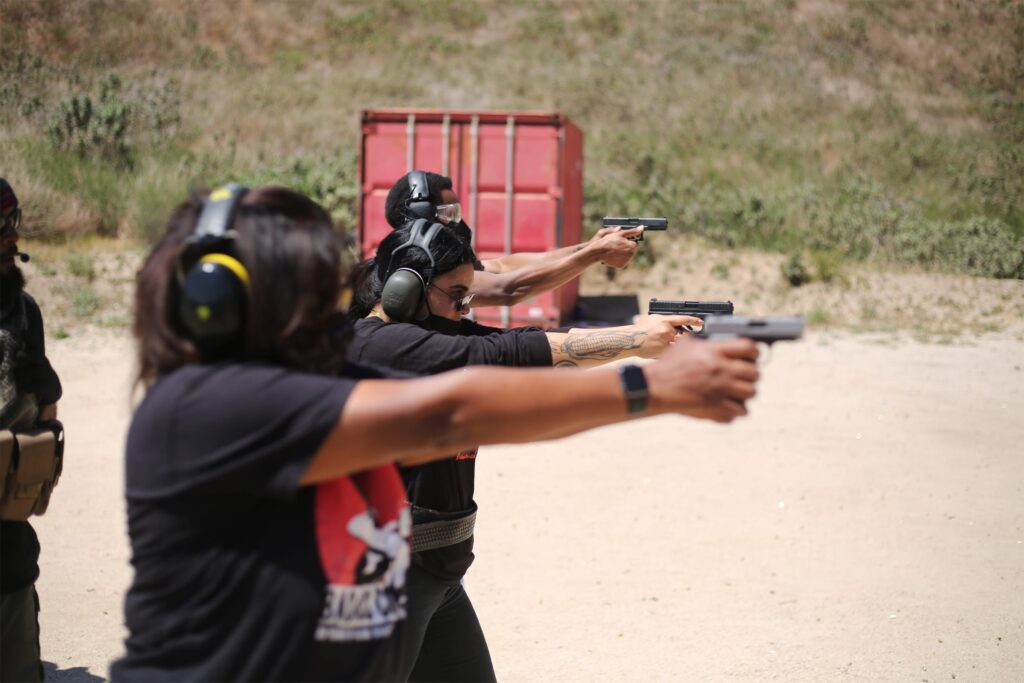
- Check the Course Provider’s Network: Some online LTC class providers might have established relationships with shooting range instructors qualified to administer the Texas LTC shooting proficiency test. If your chosen provider offers this service, it can streamline the process for you.
- Contact Local Shooting Ranges: Many public and private shooting ranges have instructors on staff who are certified to administer the LTC shooting qualification course. Contact your local shooting ranges to inquire about their instructors’ qualifications and the process for scheduling your shooting test.
- Texas DPS Instructor Listing: The Texas Department of Public Safety (DPS) website maintains a listing of instructors qualified to administer the LTC shooting proficiency test. You can search this database by location to find instructors in your area (https://www.dps.texas.gov/section/handgun-licensing/texas-department-public-safety-dps-handgun-instructor-resources-and).
What to Expect During the Live-Fire Qualification
The specific format of the shooting qualification course might vary slightly depending on the instructor, but it will generally involve the following:
- Safety Briefing: The instructor will begin with a safety briefing, reiterating safe gun handling practices and emphasizing range rules. This ensures everyone on the range prioritizes safety throughout the qualification course.
- Written Knowledge Review: Some instructors may include a brief written knowledge review to assess your understanding of firearm safety principles before proceeding with the live-fire portion of the test.
- Shooting Qualification Course: The qualification course itself will involve firing a specific number of rounds from a concealed handgun at designated targets from various distances. The exact number of rounds, distances, and qualifying scores are outlined by the Texas DPS. Passing this practical shooting test demonstrates your safe and proficient handling of a firearm.
Once you’ve successfully completed the shooting qualification course, the instructor will provide you with a certificate of completion. This certificate is a crucial document you’ll need to submit with your online LTC application to the Texas DPS.
Beyond the Online Course: Additional Training Resources
While successfully completing a Texas DPS-approved online LTC class equips you with the foundational knowledge to obtain your License to Carry, responsible gun ownership is an ongoing journey of education and skill development. Here are some resources to consider to enhance your knowledge and proficiency beyond the online LTC course:
- Recommended Follow-Up Courses:
- Advanced Handgun Skills: These courses can help you refine your marksmanship, improve shooting techniques under pressure, and explore more advanced topics like tactical reloads or malfunction clearing.
- Defensive Pistol Training: These courses delve deeper into the use of a firearm in self-defense scenarios. They often incorporate live-fire exercises that simulate real-world situations, helping you develop the skills and mindset for responsible and effective use of deadly force.
- Benefits of Joining a Gun Club or Range:
- Regular Practice: Regular practice is essential for maintaining and improving your shooting proficiency. Gun clubs and ranges often offer memberships that provide access to shooting lanes at discounted rates, allowing you to hone your skills consistently.
- Camaraderie and Mentorship: Gun clubs can be a great way to connect with other firearms enthusiasts in a safe and controlled environment. You can learn from experienced shooters, ask questions, and participate in educational events or workshops offered by the club.
- Safety and Supervision: Many gun clubs and ranges have staff instructors available to answer questions, offer guidance, and ensure safe practices on the range. This can be a valuable resource, especially for newer gun owners who want to solidify their safe handling techniques.
Remember, responsible gun ownership goes beyond obtaining a license to carry. It’s a commitment to continuous learning, safe handling practices, and ongoing skill development. The resources mentioned above can be valuable tools to help you on this journey.
Empower Your Self-Defense with a Texas Concealed Carry Class Online
Getting your Texas License to Carry (LTC) online offers a convenient and flexible path to armed self-defense preparedness. This comprehensive guide has equipped you with the knowledge you need to navigate the online LTC process with confidence.
Here’s a quick recap of the key takeaways:
- Online LTC classes are legal and DPS-approved, providing the same foundational knowledge as traditional classroom courses.
- Online courses offer unmatched convenience and flexibility, allowing you to learn at your own pace from the comfort of your home.
- To be eligible for an online LTC class, you must meet the general LTC eligibility requirements set forth by the Texas DPS. However, if you’re a complete beginner with no prior experience, an in-person class with hands-on instruction might be a good starting point.
- Online LTC classes cover all the essential topics mandated by the Texas DPS, including firearm safety, Texas LTC laws, handgun use fundamentals (if video instruction is included), dispute resolution, and license carry guidelines.
- The online course format typically involves video lectures, interactive modules, downloadable materials, and self-paced learning.
- While the online course equips you with the knowledge, you still need to pass a live-fire shooting proficiency test administered by a DPS-qualified instructor at a shooting range.
- Responsible gun ownership is an ongoing commitment. Explore follow-up courses on advanced handgun skills or defensive pistol training. Consider joining a gun club or range for regular practice, mentorship, and access to safe shooting facilities.
By following the steps outlined in this guide and utilizing the recommended resources, you can effectively navigate the online Texas LTC process and acquire the skills and knowledge necessary to carry a concealed handgun responsibly and safely within the legal boundaries of Texas law. Remember, gun ownership is a significant responsibility. Always prioritize safety, education, and ongoing skill development.
Cost Comparison of Texas Concealed Carry Class Online
While online LTC classes offer flexibility and convenience, costs can vary between providers. Here’s a table outlining the course price and some additional factors to consider when making your choice:
We are considered provider number 1! We provide a quality Texas Concealed Carry Class Online for just $40!!
Below is a table of other businesses and their LTC classes available:
| Provider | Course Price | Additional Fees | Money-Back Guarantee |
|---|---|---|---|
| Provider A | $99 | None | No |
| Provider B | $125 | $25 (certificate processing) | Yes (within 30 days of enrollment) |
| Provider C | $79 | $10 (course materials) | No |
| Provider D | $149 | None | Includes range qualification test |
Important Reminders:
- Firearm Safety at Home: Remember, online courses provide theoretical knowledge. Always prioritize safety! Only handle an unloaded firearm in a clear and safe environment when practicing gun handling techniques learned online.
- Fingerprinting Requirements: Your Texas LTC application to the DPS requires fingerprints in addition to the online course and shooting proficiency test. You can obtain fingerprints electronically or through ink cards. Check the Texas DPS website for information on approved fingerprint providers in your area (https://www.dps.texas.gov/section/crime-records/fingerprinting-services).
External Resources
For further information and resources related to Texas LTCs and gun safety, explore the following links:
- Texas Department of Public Safety – LTC Information: (https://www.dps.texas.gov/section/handgun-licensing)
- National Rifle Association (NRA) Gun Safety Courses: Explore basic pistol safety courses offered by the NRA to enhance your firearms knowledge. (https://basicpistol.nra.org/)
- Local Gun Clubs or Shooting Ranges: Use a search engine to find gun clubs or shooting ranges in your area. These resources can provide valuable information on:
- Follow-up training courses (advanced handgun skills, defensive pistol training)
- Range memberships for regular practice and skill development
- Safe shooting facilities and instructor guidance
Disclaimer
The information presented in this blog post is for general informational purposes only and should not be interpreted as legal advice. For specific legal guidance regarding LTC eligibility or any questions about Texas gun laws, consult with an attorney specializing in firearms law.
Empower Your Self-Defense Journey with a Texas Concealed Carry Class Online
Now that you’ve explored every aspect of acquiring your Texas License to Carry (LTC) online, you’re well-equipped to make an informed decision. This comprehensive guide has shed light on the process, legalities, benefits, and valuable resources to empower you on your self-defense journey.
Remember, obtaining your LTC is just the first step. Responsible gun ownership is a lifelong commitment that requires ongoing education, safe handling practices, and a dedication to continuous skill development. Utilize the resources recommended throughout this post to take advantage of follow-up training courses, connect with a local gun club or range, and prioritize your safety and knowledge as a licensed carrier.
By following the steps outlined here and prioritizing responsible gun ownership, you can confidently navigate the online Texas LTC process and ensure you’re prepared to exercise your right to carry concealed within the legal boundaries of Texas law.
Frequently Asked Questions (FAQ): Texas Concealed Carry Class Online
Is the Texas Concealed Carry Class Online legal?
As long as the course provider has received approval from the Texas Department of Public Safety (DPS), online Texas LTC classes are legitimate. Our Class is 100% Approved by Texas DPS
Is an online LTC class right for me if I have no prior experience with firearms?
This totally depends on the Student. I can say with experience that I have found it better to teach a novice because we don’t have to break bad habits.
What topics are covered in an online Texas LTC class?
Our Texas Concealed Carry Class Online classes typically cover firearm safety, Texas LTC laws, handgun use fundamentals (if video instruction is included), dispute resolution techniques, and license carry Do’s and Don’ts.
How long does it take to complete an online LTC class?
Our Texas Concealed carry class is 4 hours. The minimum the state requires. You can take your time if you like and finish longer. More convenient than in-person classes, where you could be sitting for 8 hours plus.
What happens after I finish the online LTC course?
After completing the online course, you’ll need to:
Pass a live-fire shooting proficiency test with a DPS-qualified instructor.
Submit your online application and fingerprints to the Texas DPS.
Pay the application fee and wait for your Texas LTC to arrive in the mail.
Do I need any additional training after the online LTC class?
This also depends on the student. I highly encourage my students to continue their education with their firearms. While our online course equips you with foundational knowledge, ongoing education is crucial. Consider follow-up courses on advanced handgun skills or defensive pistol training.
Can I take the online LTC class from anywhere?
Yes, in most cases you can take the online LTC class from anywhere as long as you have a reliable internet connection. However, the shooting proficiency test must be completed in person at a Texas DPS-qualified range.
What are the eligibility requirements to get a Texas LTC?
To be eligible for a Texas LTC, you must generally be:
A U.S. citizen or lawful permanent resident
At least 21 years old Now 18 is new age requirement
Not convicted of a felony or Class A or B misdemeanor
Not currently under indictment for a felony or Class A or B misdemeanor
Not a fugitive from justice
Not dishonorably discharged from the military
Mentally competent (not committed to a mental institution unless restored by a court)
What are the benefits of taking an online LTC class?
Some of the benefits of taking an online LTC class include:
Convenience and flexibility: Learn at your own pace from the comfort of your home.
Cost-effectiveness: Online courses can be more affordable than traditional classroom courses.
Self-paced learning: Review modules and quizzes as needed to solidify understanding.
What are some safety precautions to take when handling a firearm at home after completing the online course?
Even after the online course, prioritize safety:
Only handle an unloaded firearm.
Maintain a clear and safe environment when practicing gun handling techniques.
Consider seeking additional in-person instruction from a qualified instructor.
This comprehensive guide has shed light on the process, legalities, benefits, and valuable resources to empower you on your self-defense journey. Remember, obtaining your LTC is just the first step.
Responsible gun ownership is a lifelong commitment that requires ongoing education, safe handling practices, and a dedication to continuous skill development. Utilize the resources recommended throughout this post to take advantage of follow-up training courses, connect with a local gun club or range, and prioritize your safety and knowledge as a licensed carrier. By following the steps outlined here and prioritizing responsible gun ownership, you can confidently navigate the online Texas LTC process and ensure you’re prepared to exercise your right to carry concealed within the legal boundaries of Texas law.

